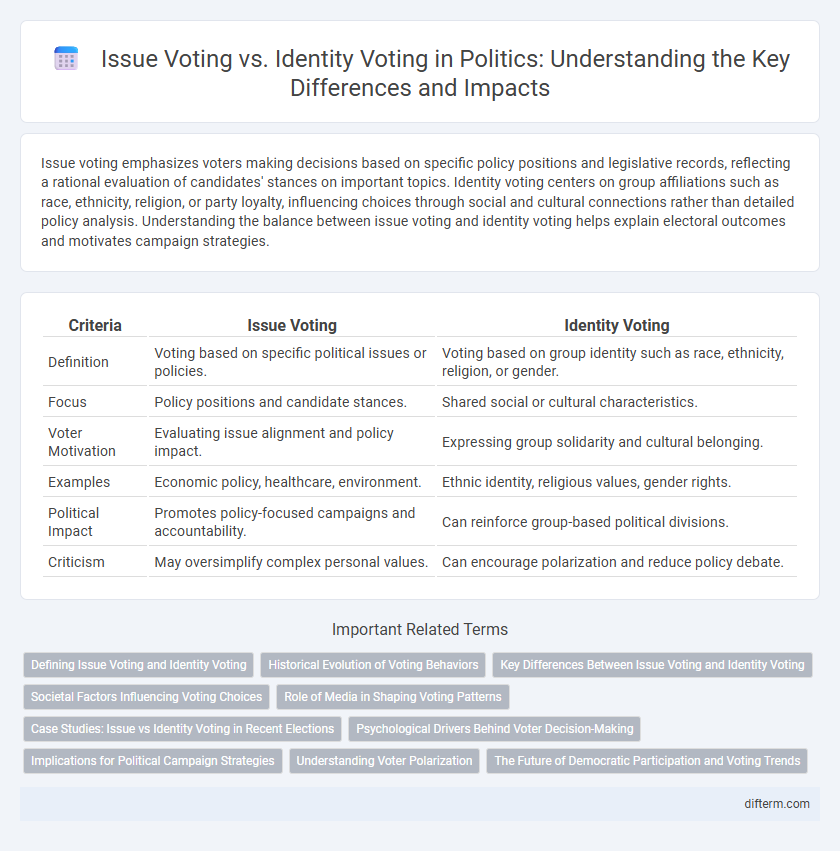Issue voting emphasizes voters making decisions based on specific policy positions and legislative records, reflecting a rational evaluation of candidates' stances on important topics. Identity voting centers on group affiliations such as race, ethnicity, religion, or party loyalty, influencing choices through social and cultural connections rather than detailed policy analysis. Understanding the balance between issue voting and identity voting helps explain electoral outcomes and motivates campaign strategies.
Table of Comparison
| Criteria | Issue Voting | Identity Voting |
|---|---|---|
| Definition | Voting based on specific political issues or policies. | Voting based on group identity such as race, ethnicity, religion, or gender. |
| Focus | Policy positions and candidate stances. | Shared social or cultural characteristics. |
| Voter Motivation | Evaluating issue alignment and policy impact. | Expressing group solidarity and cultural belonging. |
| Examples | Economic policy, healthcare, environment. | Ethnic identity, religious values, gender rights. |
| Political Impact | Promotes policy-focused campaigns and accountability. | Can reinforce group-based political divisions. |
| Criticism | May oversimplify complex personal values. | Can encourage polarization and reduce policy debate. |
Defining Issue Voting and Identity Voting
Issue voting occurs when voters base their decisions primarily on specific political policies or positions, emphasizing candidate stances on topics like the economy, healthcare, or climate change. Identity voting, by contrast, is driven by social group affiliations such as race, ethnicity, religion, or party identification, reflecting deeper personal or community ties rather than policy specifics. Understanding these distinctions helps explain voter behavior patterns and the complex motivations behind electoral outcomes.
Historical Evolution of Voting Behaviors
Issue voting emerged prominently in the mid-20th century as voters began prioritizing policy positions on key topics like civil rights and economic reform. In contrast, identity voting has roots in longstanding social affiliations such as race, religion, and ethnicity, which have historically shaped electoral coalitions in the United States. Over time, the interplay between these behaviors has shifted, with identity increasingly influencing political loyalty alongside evolving issue-based priorities.
Key Differences Between Issue Voting and Identity Voting
Issue voting centers on candidates' stances on specific policy matters such as healthcare, taxation, or climate change, allowing voters to prioritize concrete political outcomes. Identity voting, in contrast, relies on voters' alignment with social, ethnic, or cultural group affiliations, reflecting a sense of belonging rather than policy specifics. The key difference lies in issue voting's emphasis on policy preferences, while identity voting prioritizes group loyalty and shared experiences as the basis for electoral choices.
Societal Factors Influencing Voting Choices
Societal factors such as socioeconomic status, cultural background, and community norms heavily influence whether individuals prioritize issue voting or identity voting. Research shows that voters facing economic insecurity are more likely to engage in issue voting, focusing on policies that directly affect their livelihoods. Conversely, in polarized societies, identity voting often prevails as social identity, including race, religion, and ethnicity, becomes a primary determinant of electoral choices.
Role of Media in Shaping Voting Patterns
Media outlets significantly influence voter behavior by framing political issues and shaping public perception of party identities. Issue voting relies on media to provide detailed coverage of policy positions, while identity voting is often reinforced through targeted messaging and social group narratives propagated by media channels. The strategic emphasis placed by media on certain topics or identities can shift electoral outcomes by altering voters' priorities and allegiances.
Case Studies: Issue vs Identity Voting in Recent Elections
Case studies from recent elections reveal that issue voting often dominates in closely contested districts where economic and healthcare policies directly impact voter decisions. In contrast, identity voting prevails in regions with pronounced ethnic, religious, or cultural divides, solidifying party loyalty regardless of specific policy platforms. Analysis of the 2020 U.S. presidential election and the UK's 2019 general election highlights this dichotomy, where socioeconomic concerns influenced swing states while identity factors drove turnout in metropolitan and rural strongholds.
Psychological Drivers Behind Voter Decision-Making
Voter decision-making is deeply influenced by psychological drivers such as social identity and cognitive biases, which often lead individuals to prioritize identity voting over issue voting. Strong group affiliations, like race, religion, or political party, activate emotional loyalty that can overshadow objective analysis of policy positions. Understanding these psychological mechanisms reveals why identity voting persists despite clear policy differences between candidates.
Implications for Political Campaign Strategies
Issue voting emphasizes candidates' policy positions, leading campaign strategies to prioritize clear communication of policy solutions and detailed platforms. Identity voting centers on social group affiliations, prompting campaigns to tailor messaging that resonates with voters' cultural, racial, or ideological identities. Understanding the balance between these voting behaviors shapes targeted outreach, resource allocation, and coalition-building efforts in modern political campaigns.
Understanding Voter Polarization
Issue voting centers on evaluating candidates based on specific policy positions, while identity voting relies on group affiliations such as race, religion, or party identity. Voter polarization intensifies as people increasingly prioritize identity over issues, reinforcing partisan divides and reducing cross-cutting political dialogue. Research shows that identity voting correlates strongly with affective polarization, deepening societal fragmentation and complicating democratic consensus-building.
The Future of Democratic Participation and Voting Trends
Issue voting and identity voting shape the future of democratic participation by influencing voter alignment and engagement patterns. Issue voting centers on candidates' policies and government performance, fostering informed decision-making, while identity voting emphasizes social group affiliations, impacting turnout and political polarization. Understanding these dynamics is crucial for predicting voting trends and enhancing inclusive democratic processes worldwide.
issue voting vs identity voting Infographic

 difterm.com
difterm.com